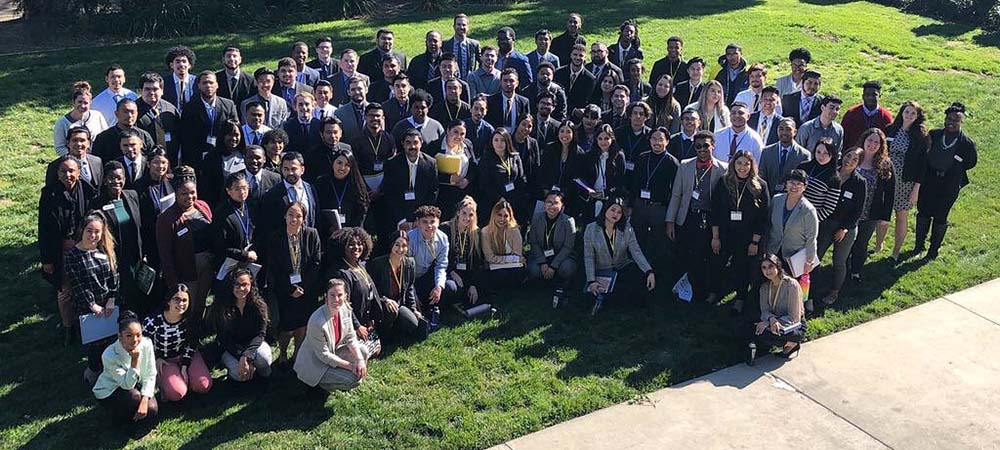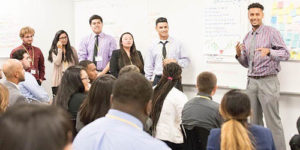
(Photo Credit: Year Up Bay Area
Twenty-three-year-old Samantha Oropeza remembers it well.
“I was a 19-year old mom with a job that wasn’t going to take me anywhere and living with my parents. I really didn’t have my own life.”
Then her dad saw an advertisement for a program called Year Up aimed to help talented young people aged 18 to 26 who have potential but lack the access to meaningful career opportunities.
 Today Samantha has a fulltime job at Workday, her own place to live and a vision for a very promising future. “It changed my life.”
Today Samantha has a fulltime job at Workday, her own place to live and a vision for a very promising future. “It changed my life.”
The Year Up program has been changing many lives in the San Francisco Bay Area and was named the first-place winner in the 2020 Partnerships for Industry and Education (PIE) Contest and will be honored at the California Economic Summit on December 3-4.
Emily Schaffer, Year Up managing director based in San Francisco, describes the reason for the program as, “Talent is equally distributed in our country, but opportunity is not.”
That’s where Year Up comes in, bridging a widening gap between talented young people who are locked out of opportunities and disconnected from the economic mainstream because they lack access to necessary skills training and education, and employers who face a growing need for diverse, skilled, and motivated talent to fill today’s in-demand jobs and those of the future.
The program is intense.
Once a student is accepted, they are exposed to Year Up’s “high expectations, high support” approach, which includes a team of social workers and other professionals, as well as a contract that outlines responsibilities for students. Responsibilities include being on time and developing soft skills like public speaking and teamwork.
 A class of approximately 40 students at a time — supported by a dozen or so staff members — works together for 32 hours a week for 21 weeks, receiving specialized technical training aligned with in-demand career pathways employers in the Bay Area are looking to fill.
A class of approximately 40 students at a time — supported by a dozen or so staff members — works together for 32 hours a week for 21 weeks, receiving specialized technical training aligned with in-demand career pathways employers in the Bay Area are looking to fill.
A partnership between Diablo Valley College in Pleasant Hill and Year Up allows 160 students to access technical instruction while they earn college credits, as well as connecting them to the California Promise funding to support higher education.
“DVC has been a highly-committed partner with the Year Up program since 2017,” said DVC Senior Dean of Curriculum and Instruction Kim Schenk. “The California Community Colleges are a primary driver of workforce development. Programs like this that provide a bridge over the ‘Opportunity Divide’ for young workers, preparing them to be part of a skilled workforce in living-wage occupations, are one of our core missions.”
Once they complete the learning phase of the program, they apply their skills training during a corporate internship — gaining hands-on experience at a Fortune 1000 company like Facebook, Kaiser Permanente, LinkedIn, Salesforce, and Workday. A total of 65 companies in the Bay Area look to Year Up as a strategic source of talent.
“We provide internships for many Year Up students because it provides Salesforce with access to a talented group of graduates whom we hire to meet our skilled labor needs, which in turn increases our competitiveness,” said Salesforce Chief Philanthropy Officer & Executive Vice President of Marketing Ebony Beckwith. “They bring diversity of thought, experience, and perspective, and you find more productive teams. They’re able to draw on their experiences, grit, determination, and motivation.”
As it has in virtually all aspects of the California economy, the COVID-19 public health emergency has disrupted the Year Up program. But, according to Schaffer, more corporations are looking for diversity in the workforce, and as our economy reinflates in the coming months, more partners will be interested in joining the program.
“Helping students build habits that can have them succeed in their careers and benefit employers is a proven formula to addressing California’s workforce preparation needs,” said Schaffer. “Our program has demonstrated strong results towards helping meet the talent demands in the Bay Area, and we look forward to continuing to deliver quality outcomes by evolving alongside a changing workforce and responding to emerging employer needs.”
For Samantha Oropeza, the future is bright thanks to the program.
“I learned to work with my teammates, supporting them while they supported me. As a young minority who didn’t have much of a support system, it taught me so much. I’m very lucky.”
The PIE Contest is now in its fourth year and is designed to identify, promote, and honor programs that are meeting the state’s increasing need for a skilled workforce that can maintain the Golden State’s global leadership.

